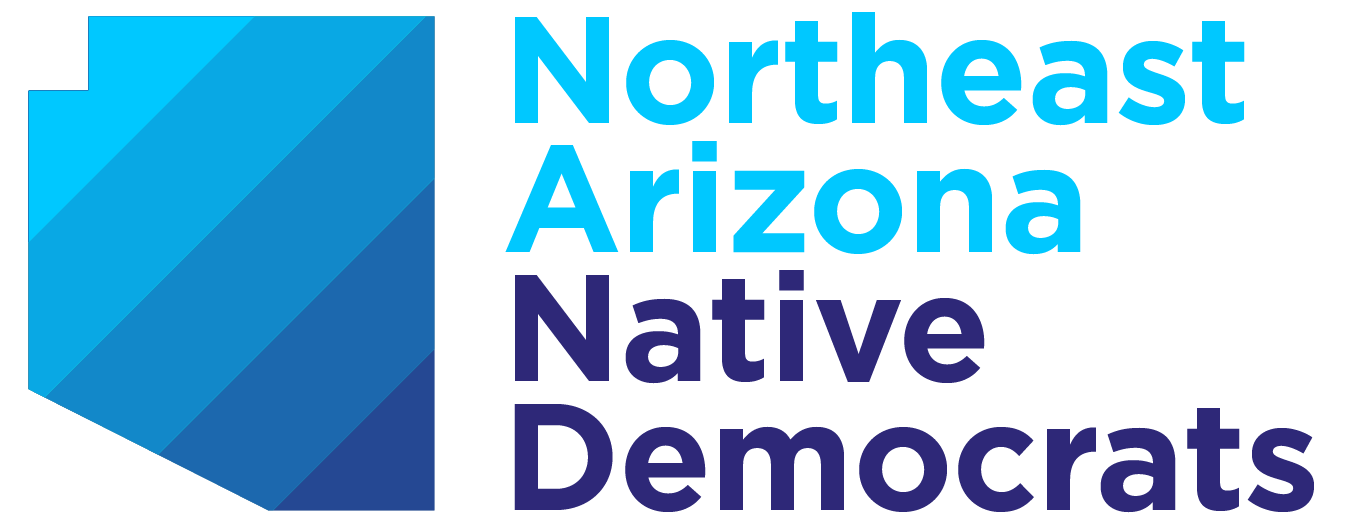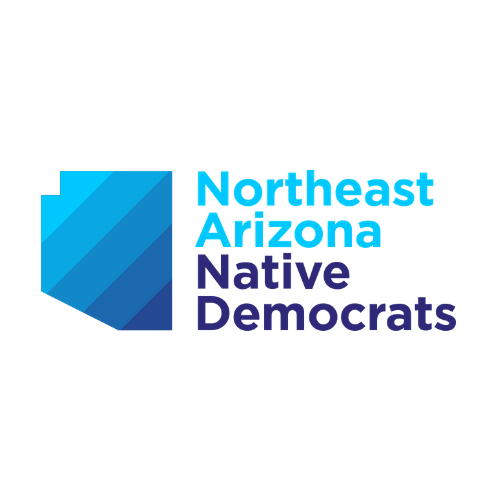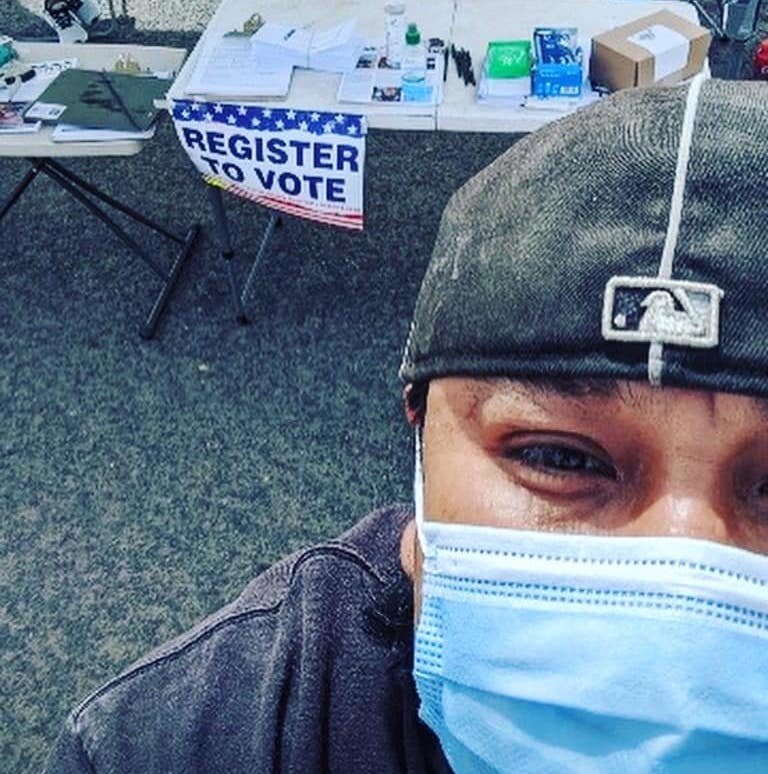
2023 Rural and Tribal Engagement– Year Round Organizing and Build Year for 2024 Elections
Priorities include educating communities about our county offices and leaders; Navajo, Apache, and Coconino
Build up our Family Votes Matriarch Program
Register more voters and stay connected with them all year long.
Launch our Native Youth initiative.
Give back and help our communities; back to schools drive, water, food, and wood distributions, winter emergency kits distributions, and more.
2022 Rural and Tribal Engagement–It All Comes Down to Turnout for the Midterm Elections
November 2022 - We currently have 20 paid organizers and over 20 regular volunteers. Depending on the activity and time frame we’ve had up to 1,000+ volunteers at a time (ex. postcard writers).
March 2022 - We have 5 paid organizers working across three tribal communities. Our goal is to hire 10-20 more Indigenous organizers to cover Navajo, Hopi, and Apache lands including key bordertowns.
Launch Family Votes program and recruit matriarchs to register their families and communities to vote
Educate communities on the new legislative and congressional maps and candidate petition signing process
Fight new voter suppression legislation before it gets to the governor’s desk
Elect Democratic candidates up and down the ballot
Increase Precinct Committee Member (PC) Recruitment
Continue spearheading Cafe 7, trainings, and county meetings
2021 Rural and Tribal Engagement. There are no “off” years, this is a building year.
NORTHEAST ARIZONA NATIVE DEMOCRATS: THERE ARE NO “OFF” YEARS, THIS IS A BUILDING YEAR.
The term “off year” also known as a non-election year in the political world is shifting. In rural and remote areas like ours in northeast Arizona, we’ve been working, planning, and building for 2022 and beyond. Too often our communities are the first to be left out after an election. Many times there is little to no engagement with voters until two to three months before a campaign ends. Our team of Northeast Arizona Native organizers have set out to change this ineffective model of political engagement and made it our goal to be present and active year around.
We started building and planning in January 2021, hiring organizers in March 2021. And with the help of generous donors, like you, we’ve been able to keep an incredible field team in place engaging, educating and empowering voters.
Northeast Arizona Native Democrats Summer 2021 Initiatives (several are continuing into the fall):
100+ students in Bacavi, Whiteriver, and Pinon received back to school supplies and clothing with the help of Dems Give Bac.
Weekly community clean up in Kayenta, AZ.
Hired four organizers from three sovereign nations; Navajo Nation, Hopi, and White Mountain Apache
Held regular community service events
Food box distribution
School supply distribution
Purchased solar panels and fans for elders
Hosting weekly community clean-up events
Registered over 100 voters
Collected thousands of petitions signatures to protect voting rights (AZ Deserves Better initiative)
Fought to make Arizona’s Redistricting fair by educating citizens and encouraging them to make public comments to the Redistricting Commission
Made over 22,000 voter contacts to High Potential Voters
Phonebanked our High Potential Voters
Continuously inform communities about voter suppression bills and how we can stop it by reaching out to elected leaders to pass the John Lewis Voting Rights Act, Native American Voting Right Act, and For the People Act.
Educated voters on how their votes have altered the path of this nation and our state and how they can fight Republican voter suppression efforts.
Weekly petition and voter registration drives give our team an opportunity to talk with voter about Redistricting.
Our project is active everyday of the year to ensure historic turnout in every election going forward. We have harnessed the momentum of 2020 and have turned it into a program that will keep voters engaged and create good voting habits. Our campaign and work is centered on the power of voters and our collective ability to chart a new course for this state and nation.
Thank you again to our donors, volunteers, and organizers. You are the reason our team can continue to build this year for 2022 and strengthen Democratic presence in rural and tribal communities of northeast Arizona. We are grateful for all your support, words of encouragement, and willingness to make calls, write postcards, and so much more.
To help continue organizing efforts and protect voting right contributions can be made to
DONATION LINK: https://secure.actblue.com/donate/navajoconativeorganizing
Checks may also be mailed to: Navajo County Democrats — Native Organizing Fund PO Box 144, Lakeside, AZ 85929 · (928) 224-8021
In 2020, we hired 20 to 30 Native organizers who were incredibly dedicated to their communities and are the foundation of this program. We have two engagement programs, one online and the other offline. This dual effort reaches our elders as well as the younger generations. We know elders are reliable and consistent voters, so for them we need to help with the transition to vote by mail and other safe voting measures. The second effort engaged non-voters and younger generations to grow our voter base. Our organizers know their communities. They found creative ways to engage folks with an integration of COVID relief efforts and civic engagement. Our organizers are trusted sources and make the connection to needed resources, policies, and actions that are tied to voting and the Census.
2020 Election Highlights:
Tribes helped turn Arizona blue in a presidential election for only the 2nd time in the last 72 years.
See a list and results of the Democratic candidates we supported in each of the counties we covered here: bit.ly/neazndcandidates
Native voters, on tribal lands, in Apache, Navajo, Coconino, Gila, and Graham counties overwhelmingly voted for Joe Biden/Kamala Harris, Mark Kelly, Tom O’Halleran, and all our Democratic candidates up and down the ticket. This was visually indicated by the widely circulated Arizona Central story about Native voters written by journalist Shondiin Silversmith of the Navajo Nation.
Arizona Native voters cast more than 92,000 votes for Joe Biden, a state where he won by less than 20,000 votes.
The five counties we covered increased voter registration by over 21,000 new voters in the past year, early voter and overall turnout by ~48,000 voters, which was nearly a 50% increase in early vote turnout and around a 30% increase in overall turnout.
Apache County currently shows an almost 70% voter turnout, Coconino County a little over 80% and in the precincts on tribal lands in Navajo, Gila, and Graham counties, there was 82% to 85% voter turnout.
In Navajo County, we have large tribal population centers and Democratic voters in the northern and southern parts of the county. We have more work to do in the border towns and central parts of the county where many of the residents are White Republicans.
In Gila and Graham County our tribal communities are smaller. However, we're going to continue to have the greatest influence we possibly can and build.
Judy Begay, candidate for Coconino County Board of Supervisor District 4 won with 58.4%, defeating former state representative Republican Bob Thorpe. Judy is only the second Navajo woman to serve in this position. Now, four of the five members of the Coconino County Board of Supervisors will be women, two of them Navajo. All five are Democrats.
Three Navajo state legislators for state legislative District 7 were re-elected; State Senator Jamescita Peshlakai, along with Representatives Arlando Teller and Myron Tsosie.
Our team of organizers and volunteers made over 30,000 phone calls this cycle and had over 3,000 voter registration forms returned directly to us. We were not able to measure online voter registrations and instead directed folks to the Arizona’s Secretary of State and IWillVote.com links (there were limitations of use).
Our team delivered and posted almost 800 hundred candidate signs and employed an additional 20 organizers to help with door-to-door literature drops. The pamphlets were written and designed by and with Indigenous people to be read and understood by their friends and family. We hired local, Indigenous folks to deliver these pamphlets to roughly 20,000 homes across the tribal lands in Northeast AZ.
Many of our organizers like Braden Nez in Coconino County maintained social distancing by registering hundreds of voters in their vehicles.
Our team grew into a robust group of 25. At several points we had 30 paid Indigenous organizers spread out across the vast expanses of the Navajo Nation, the Hopi Tribe, San Carlos Apache Tribe, and White Mountain Apache Tribe.
Organizers and volunteers coordinated weekly phone and texting banks, drove thousands of miles to pick up and post signs, deliver registration forms, PPE, food, firewood, water, hay for livestock and more. We had Priscilla and John who wrote and created fun and informative radio ads in Navajo and English. Well respected leaders like Peterson Zah recorded radio ads and videos in Navajo and English. We had videos recorded in Navajo and English that explained and showed the vote by mail process and how to return your ballot.
We had volunteers all over the country who stepped up and created social media ads for us, made graphics for us, crafted emails, newsletters, wrote postcards, and connected us to donors.
Since late July, we raised close to $260,000 from over 5,600 individual donors for the tribal organizing program to pay our organizers and campaign expenses. Funds paid for printing costs, homemade signs, radio and prints ads, mailers, PPE, fuel, stipends, internet and phone bills. And the good thing about this program is we're going to continue with the program.
Meet Joanne Peshlakai
Field Organizer Joanne Peshlakai (Diné/Navajo) has been registering Navajo voters for years and is working to reach Navajo elders. Thank you Joanne, for sharing your story with us!
Meet Beatrice Begay
Field Organizer Beatrice Begay (Diné/Navajo) is a teacher and works with us part-time. Beatrice said she had some time to reflect during Navajo Nation’s long weekend lockdowns and was reminded of the work her mother and father did in the community.
Ahe'hee Beatrice for sharing your story. We are thankful for your parents' support, inspiration, and showing you the ropes. I can’t wait to see your dad join you on the campaign trail!
Meet Jandi Craig
Jandi Craig is a proud member of Dził Łigai Si’an Ndee – the White Mountain Apache Tribe, and Xicana. She belongs to the Dischiidn (Red Horizontal People) clan born for Nakaiye (Chihuahua, Mexico); and was born and raised in her ancestral homelands on the Fort Apache Reservation. Jandi works to develop cultural wellness and mental health programs, trauma-informed care, policies addressing systemic racism, data processes, and grant management. Jandi is a 2017 Indigenous Fellow for the United Nations Office of the High Commissioner for Human Rights, 2018 Indigenous Women’s Global Leadership Scholar at Columbia University Institute for the Study of Human Rights, and co-coordinator of the North Region (USA) Continental Network of Indigenous Women of the Americas. Jandi enjoys life in ceremony as a traditional Apache mother with her three children, and carries the stone for three traditional Goddaughters.
Meet Debbie Nez-Manuel
Mrs. Debbie Nez-Manuel,(Diné) is citizen of the Navajo Nation and a mom raising her family on the Salt River Pima-Maricopa Indian Community. Debbie earned her Masters of Social Work from Arizona State University with a focus in Nonprofit Leadership. Debbie has a deep commitment to public service and has helped lead efforts to develop Arizona’s state-wide plan to examine Missing and Murdered Indigenous Women and Girls (MMIWG) and currently serves as the co-chair of the MMIWG Data Sharing Committee. In January of 2020, Debbie was elected as the first Native American Democratic National Committee member in Arizona and is now making sure tribal citizens are registered to vote and not further disenfranchised from the voting process.
Meet Sareya Taylor
Sareya Taylor is a 18 year old member of the White Mountain Apache and Navajo tribes. Sareya’s pronouns are she/her/they/them. She served as the 2020 Youth Poet Laureate of Phoenix, member of the International Indigenous Youth Council, and a Unity 25 under 25 youth.
And the pronunciation is suh-ree-yuh.
Meet Jonathan Yazzie
Field Organizer Jonathan Yazzie (Diné/Navajo) is working to reach Navajo elders, youth, and voters, which isn't easy in the midst of the pandemic. Jonathan is organizing his community of Tolani Lake, AZ on the Navajo Nation. Ahéhee' - thank you - Jonathan for all that you are doing.
Meet Daryl Lomatewama
Daryl is from Hotevilla and previous to being a field organizers worked in construction and has been assisting with COVID relief efforts.
Stay tuned for more stories!
Thank you Apache, Hopi, and Navajo organizers for registering voters and making every day count. Thank you for collecting last minute voter registration forms and physically driving them to your local county recorders office. This is no small feat, especially in rural areas. Some have to drive 1 hr 30 min. (one way) or more. You are amazing! We know your love for community and passion to make positive change at every level. We see you and are so proud of you.
Photo by Jandi Craig, White Mountain Apache Tribe










